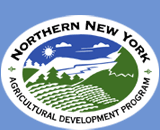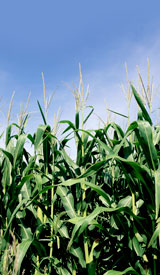

Northern New York Agricultural Development Program Press
Releases
February 21, 2006
Contacts: Jefferson County: Sue Gwise, Mike Hunter, 315-788-8450; Essex County: Anita Deming, 518-962-4810; Cornell Baker Research Farm: Michael H. Davis, 518-963-7492
NNY Research Testing Cold Weather Hardiness of Locally-Grown Grapes
Why are Northern New York grape growers in their vineyards in February? Because, with $20,000 in funding from the Northern New York Agricultural Development Program (NNYADP), they will be testing the winter hardiness of more than two dozen varieties of grapes at sites in Jefferson and Essex counties. The funding also supports the testing of fungal controls at an organic vineyard in Essex County.
In Jefferson County, growers and Extension educators Sue Gwise and Mike Hunter are assessing options for the placement of two weather stations in existing vineyards.
�We will be selecting sites that give us the largest cross-section of varieties for testing. This research will look at which varieties survive and which don�t,� says Gwise, a horticultural educator with Cornell Cooperative Extension of Jefferson County. �We currently only have data for grapes grown on Long Island and in the Finger Lakes and that data does not apply here.�
Yellow Barn Winery owner Nicholas Surdo says this research will provide a baseline of information regarding how the different varieties grow in Northern New York conditions.
�We need to understand how our cold affects the varieties and how big a factor our traditional January thaw is for growing grapes,� says Surdo, a retired dairyman who has grown grapes for the last six years and is interested in varieties for winemaking, fresh eating, and farmstand sale.
�As agricultural producers transition from more conventional farming, such as dairy farming, to alternative agricultural enterprises, there is a certain amount of risk involved. The Northern New York Agricultural Development Program supports on-farm research and provides producers an opportunity to test new crops or varieties on a smaller scale basis as a way to minimize risk. This project will generate valuable information for grape growers in our region,� says Hunter, a crops specialist with Cornell Cooperative Extension of Jefferson County.
Gwise adds, �Interest in a Northern New York grape industry is exploding. More and more people are attending the monthly meetings of the Seaway Wine and Viticulture Association.�
Research data from the Western Northern New York grape trials will be posted on the Cornell Cooperative Extension of Jefferson County website.
In Essex County, members of the Lake Champlain Grape Growers Association have helped researchers design a trial to test the cold-hardiness of more than 26 varieties of grapes planted at the Cornell Baker Research Farm at Willsboro. The growers are helping to maintain the vineyards there and learning best management practices for trellising, pruning, plant health monitoring, record keeping and harvesting.
The work at Willsboro builds on variety trials funded by the New York Farm Viability Institute, and allows researchers to compare varieties at one site.
�By working directly with the growers, we get their immediate input on the issues that are most critical to them and they gain the first-hand experience with the production decisions made for the trials,� says Farm Manager Michael Davis.
Lake Champlain Grape Growers Association President Rob McDowell says the research work at Willsboro is a catalyst for building excitement about the region�s potential for grape growing.
�In addition to providing us with a great reference for industry standard practices from Cornell University, this project is giving us the added benefit of attracting grape specialists to whom we can pose questions,� McDowell says.
McDowell�s organic production vineyard in Beekmantown/Plattsburgh will host a NNYADP project to test the anecdotal claims of success for fungal controls such as milk tea and compost tea on organically grown grapes.
�This project allows us to work in an established on-farm vineyard with four-year-old vines that are producing grapes to test the efficacy of fungal controls that are said to work well. We expect to have some interesting data at the end of the 2007 growing season and in the years to come,� Davis says.
Cornell Cooperative Extension of Essex County Director Anita Deming comments on the value of grapes as an alternative crop for regional farmers interested in producing fresh grapes and value-added grape products.
�We have more and more people becoming interested in growing grapes here, and we have growers who believe there is a fabulous market for local organic grapes,� Deming says. �We are helping farmers find a new product that will enhance both farming and tourism. This project is helping our other fruit industries that are also looking at producing wine as a value-added product.�
As available, research results are shared via workshops and the CCE-COLD-COUNTRY-VITICULTURE-L@cornell.edu e-list serve, coordinated by the Northeastern NY Area Fruit Program, that reaches 68 growers in New York, Vermont, Minnesota, Michigan and Quebec.
The Northern New York Agricultural Development Program is a farmer-driven research and education program specific to New York six northernmost counties (Essex, Clinton, Franklin, Jefferson, Lewis, St. Lawrence). For more information, visit www.nnyagdev.org or contact Board Chairs Jon Greenwood, Canton, 315-386-3231, or Joe Giroux, Plattsburgh, 518-563-7523, or call R. David Smith at Cornell University at 607-255-7286.
Contacts: Jefferson County: Sue Gwise, Mike Hunter, 315-788-8450; Essex County: Anita Deming, 518-962-4810; Cornell Baker Research Farm: Michael H. Davis, 518-963-7492
NNY Research Testing Cold Weather Hardiness of Locally-Grown Grapes
Why are Northern New York grape growers in their vineyards in February? Because, with $20,000 in funding from the Northern New York Agricultural Development Program (NNYADP), they will be testing the winter hardiness of more than two dozen varieties of grapes at sites in Jefferson and Essex counties. The funding also supports the testing of fungal controls at an organic vineyard in Essex County.
In Jefferson County, growers and Extension educators Sue Gwise and Mike Hunter are assessing options for the placement of two weather stations in existing vineyards.
�We will be selecting sites that give us the largest cross-section of varieties for testing. This research will look at which varieties survive and which don�t,� says Gwise, a horticultural educator with Cornell Cooperative Extension of Jefferson County. �We currently only have data for grapes grown on Long Island and in the Finger Lakes and that data does not apply here.�
Yellow Barn Winery owner Nicholas Surdo says this research will provide a baseline of information regarding how the different varieties grow in Northern New York conditions.
�We need to understand how our cold affects the varieties and how big a factor our traditional January thaw is for growing grapes,� says Surdo, a retired dairyman who has grown grapes for the last six years and is interested in varieties for winemaking, fresh eating, and farmstand sale.
�As agricultural producers transition from more conventional farming, such as dairy farming, to alternative agricultural enterprises, there is a certain amount of risk involved. The Northern New York Agricultural Development Program supports on-farm research and provides producers an opportunity to test new crops or varieties on a smaller scale basis as a way to minimize risk. This project will generate valuable information for grape growers in our region,� says Hunter, a crops specialist with Cornell Cooperative Extension of Jefferson County.
Gwise adds, �Interest in a Northern New York grape industry is exploding. More and more people are attending the monthly meetings of the Seaway Wine and Viticulture Association.�
Research data from the Western Northern New York grape trials will be posted on the Cornell Cooperative Extension of Jefferson County website.
In Essex County, members of the Lake Champlain Grape Growers Association have helped researchers design a trial to test the cold-hardiness of more than 26 varieties of grapes planted at the Cornell Baker Research Farm at Willsboro. The growers are helping to maintain the vineyards there and learning best management practices for trellising, pruning, plant health monitoring, record keeping and harvesting.
The work at Willsboro builds on variety trials funded by the New York Farm Viability Institute, and allows researchers to compare varieties at one site.
�By working directly with the growers, we get their immediate input on the issues that are most critical to them and they gain the first-hand experience with the production decisions made for the trials,� says Farm Manager Michael Davis.
Lake Champlain Grape Growers Association President Rob McDowell says the research work at Willsboro is a catalyst for building excitement about the region�s potential for grape growing.
�In addition to providing us with a great reference for industry standard practices from Cornell University, this project is giving us the added benefit of attracting grape specialists to whom we can pose questions,� McDowell says.
McDowell�s organic production vineyard in Beekmantown/Plattsburgh will host a NNYADP project to test the anecdotal claims of success for fungal controls such as milk tea and compost tea on organically grown grapes.
�This project allows us to work in an established on-farm vineyard with four-year-old vines that are producing grapes to test the efficacy of fungal controls that are said to work well. We expect to have some interesting data at the end of the 2007 growing season and in the years to come,� Davis says.
Cornell Cooperative Extension of Essex County Director Anita Deming comments on the value of grapes as an alternative crop for regional farmers interested in producing fresh grapes and value-added grape products.
�We have more and more people becoming interested in growing grapes here, and we have growers who believe there is a fabulous market for local organic grapes,� Deming says. �We are helping farmers find a new product that will enhance both farming and tourism. This project is helping our other fruit industries that are also looking at producing wine as a value-added product.�
As available, research results are shared via workshops and the CCE-COLD-COUNTRY-VITICULTURE-L@cornell.edu e-list serve, coordinated by the Northeastern NY Area Fruit Program, that reaches 68 growers in New York, Vermont, Minnesota, Michigan and Quebec.
The Northern New York Agricultural Development Program is a farmer-driven research and education program specific to New York six northernmost counties (Essex, Clinton, Franklin, Jefferson, Lewis, St. Lawrence). For more information, visit www.nnyagdev.org or contact Board Chairs Jon Greenwood, Canton, 315-386-3231, or Joe Giroux, Plattsburgh, 518-563-7523, or call R. David Smith at Cornell University at 607-255-7286.
